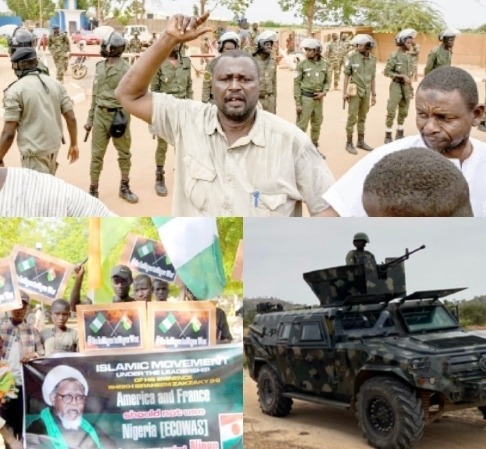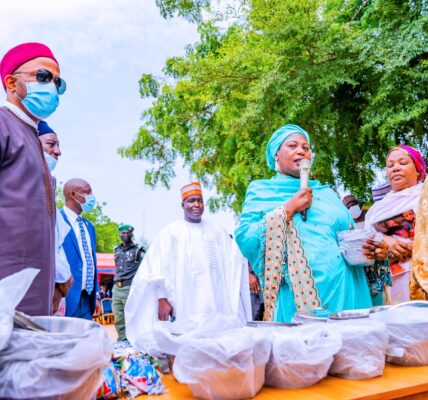Niger Crisis: Border Communities Decry Rising Food Prices As Troops Lament Hunger – Report
This post has already been read 839 times!
In the aftermath of the preparations by the standby troops to the Economic Community of West African States (ECOWAS) to invade Niger in a move to forcefully reinstate the ousted President of the West African country, Mohamed Bazoum, prices of food items have gone up in some Nigerian border communities.
Daily Trust reports that the development is owing to the border closure enforced against Niger Republic following the country’s junta’s refusal to restore the ousted President to office.
The ECOWAS had slammed sanctions on Niger and lately ordered its standby force to restore constitutional order in the West African nation; a move that had been widely rejected, especially in Nigeria.
As the impasse lingers, residents of border communities in some states in northern Nigeria told Daily Trust on Sunday that the situation had resulted in high cost of food items.
A resident of Illela Local Government Area of Sokoto State, which shares border with Konni Local Government Area in Taohoua State of Niger Republic, said most of the food items there were from Niger.
“There’s scarcity of perishable items in our community because of the border closure,” he said.
According to him, the price of a bag of foreign rice has risen from N30,000 to N50,000.
“Prices of other food items also skyrocketed. For instance, a bag of millet is over N60,000,” he added.
Residents of Jibia in Katsina State, under the aegis of the Jibia Peoples Forum, had written a letter of complaint to the Comptroller-General of the Nigeria Customs Service, accusing security officers of charging exorbitant amounts on truck conveying food items.
In the letter signed by its secretary, Bashir Lawal Jibia, the forum stated, “On behalf of the people, traders, merchants and neighbours, we hereby forward our grievance against Nigeria Customs and other security agencies operating along the Katsina-Jibia highway concerning their attitude towards free-flow of essential commodities into Jibia Local Government.
“The items include floor, cement, agricultural products, both perishable and non-perishable, house furniture, building materials, all made in Nigeria, are not allowed to pass freely into Jibia market without clearance from the Nigeria Customs house upon payment of exorbitant charges, ranging from N70,000 to N 120,000 per truck without official receipt.”
A resident of Jibia, Nasiru Abdulkadir, expressed fear that should war break out between Nigeria and Niger, farmers in the area would not be able to access their farms anymore.
A resident of Kwangwalam, Hamza Muhammad said, “After the coup in Niger, only Civil Defence officers were deployed to Kwangwalam border, but the situation is very tough now as people can hardly afford food items due to their high cost.”
We’re Starving at the Border – Nigerian Troops
Nigerian soldiers and civilian JTF stationed at Malamfatori, a neighbouring town to Niger, complained of acute shortage of food and other essential items.
One of the soldiers told our correspondent that: “There hasn’t been any food supply to us since the last one we received from Maiduguri over a week ago. Now, Nigeriens soldiers have completely prevented us from crossing to buy food in Bosso.
“Before the last ECOWAS meeting, we had an understanding that two soldiers or CJTF would drop their guns, wear mufti and cross to Bosso to buy food items. But now, it is a total shutdown.”
He said people in border communities lived in fear as business activities had stopped.
“Even the man who was supplying food to us before this coup said they couldn’t get supply through the Cotonou border despite high demand and shortage of the food items in the country,” he added.
Also, residents at the border communities of Dikorari, Jaramidi, Kaska, Tulo-tulowa Dumar, Gidigir, Mallawa, Ngamdu and Funai decried shortage of food and high cost of items.
Mallam Sile Mella, a resident of Dikorari said, “Most of us combining business with farming have lost hope this season. We sold our livestock and reinvested in our farms. Now, we lost everything and we don’t have food to eat.”
A resident of Jarimidi village, a border town in Yunusari Local Government Area of Yobe State, Audu Mai Aazara, lamented, “We are in serious food shortage, and our morale to farm was dampened by the dry spell we are witnessing.
“Now, many of us that have farmlands in Niger had to abandon them because Nigerien soldiers don’t allow us into their country,” he said.
Top Islamic clerics from Nigeria, led by the national chairman of Jama’atu Izalatil Bid’ah Wa Iqamatus Sunnah (JIBWIS), yesterday arrived in Niger Republic in a move to intervene in the current impasse.
The clerics included Sheikh Bala Lau, Sheikh Kabir Gombe, Sheikh Yakubu Musa, Sheikh Mansur Sokoto, among others.
They had on Wednesday met with the chairman of ECOWAS and Nigerian president, Bola Tinubu, at the Aso Rock Presidential Villa, Abuja and got his nod to dialogue with their Nigerien counterparts on how to resolve the country’s crisis.
The ECOWAS Parliament, on Saturday was divided over a possible military action as an option aimed at resolving the political situation in Niger Republic and restoring civil rule there.
ECOWAS Parliament Split over Military Action, Protest Hits Kano
ECOWAS had on Thursday ordered the activation of a standby force for possible use against the junta, saying it wanted a peaceful restoration of democracy, but all options, including force, were on the table.
The order for the activation of a standby force came after the junta defied an August 6 deadline set by ECOWAS for it to stand down.
The junta then closed Niger’s airspace and vowed to defend the country against any foreign attack.
However, during the virtual extraordinary meeting to discuss the political crisis in Niger on Saturday, some members of the ECOWAS Parliament identified diplomacy and dialogue as the best approaches to tackling the crisis.
No fewer than 22 parliamentarians participated in the session.
Some members who were against military intervention highlighted the economic challenges the people of Niger could experience if invaded.
Ali Djibo from Niger Republic said at least 9,000 schools had been closed down already owing to the crisis.
“As we speak, over 1,000 trucks loaded with goods are stranded at the border.
“If coup happened in Nigeria or Cote d’Iviore, where is the ECOWAS going to mobilise troops to fight the Nigerian or Ivorian military? How many borders are we going to close?
“We must also bear in mind that if we are applying the ECOWAS treaty, it should be applicable to all,” he said.
Members of the ECOWAS Parliament making a case for military intervention in Niger said diplomacy had contributed to the increase in the spate of military takeover of government in the West African sub-region.
Adebayo Balogun posited that ECOWAS leaders were proposing military action to remove the junta, adding that it was not going into a fully-fledged war.
He recalled that Niger was a signatory to ECOWAS’ revised protocol on non-military intervention.
In the same vein, Bashir Dawodu said ECOWAS should open itself up to the possibility of a military option and apply pressure on the putschists while exploring dialogue.
The first deputy speaker of the Parliament, Idris Wase, opposed the use of military force, saying, “We should be careful not to start what we can’t finish. When the Russia-Ukraine war started, people thought it was going to be sharp. A year after, the war is still lingering, with the attendant economic squander and wanton destruction of lives and property.
“Any war on Niger will have adverse effect on 60 per cent of Nigeria, especially, northern Nigeria.”
A Nigerian senator and member of the ECOWAS parliament, Ali Ndume, said, “President Tinubu has no right to close the Niger-Nigeria border and cutting electricity without the approval of the Nigerian National Assembly. It is not the juntas that are suffering the sanctions but innocent people.”
Another ECOWAS parliamentarian, Hadja Satu Camara, said citizens must be considered before any political sentiment, warning that the current economic dispensation in West Africa does not favour war as the best solution to oust the crisis in Niger.
Protest in Kano against Coercion
There was protest in Kano State yesterday against the planned use of force to resolve the Republic of Niger’s imbroglio.
The protesters, along Ibrahim Taiwo Road, one of the busiest commercial areas in Kano, displayed Nigeria and Niger’s flags alongside placards, chanting anti-war catchphrases.
As revealed by one of the banners, among the protesters were members of the Islamic Movement under the leadership of Sheikh Ibrahim El-Zakzaky.
The demonstrators alleged that war against Niger Republic “is a plot by western forces.”
Moving in a procession, they were chanting: “Nigeriens are our brothers, Nigeriens are also our family. Niger is ours, we don’t want war. War against Niger is injustice, a plot by the western forces.”
Reacting, the Kano State Commissioner of Police, Hussaini Gumel, told journalists that the police did not approve any protest, and as such, the police were not aware of the protest.
“You can see that we are just coming back from the passing-out ceremony of graduates of the Nigeria Police Academy, Wudil, where about 169 cadet officers were commissioned by President Tinubu.
“Frankly speaking, I have not given any person or group of residents permission to embark on demonstration because of the political happenings in our next-door neighbour, Niger Republic.
“You can see that Kano is a peaceful state and we will continue to provide security to enable residents to move about their businesses without threats to lives and property,” he said.
Defence Chiefs’ Meeting Suspended
A meeting of the ECOWAS defence chiefs scheduled for yesterday in Accra, Ghana, was postponed indefinitely for “technical reasons.”
The meeting was expected to inform ECOWAS’ leaders about “the best options” for activating and deploying the regional bloc’s standby force against Niger’s junta.
Ex-Niger’s Leaders Write Tinubu Against Invasion
A former Niger’s president, Mahamane Ousmane, alongside 13 former prime ministers and speakers of the National Assembly (Assemblée Nationale) have written to the Nigerian President Tinubu advising against military action in their country, and called for a diplomatic solution.
The letter was also copied to the United Nations secretary-general, the president of the African Union, the European Union delegation and all the embassies in Niamey.
Bazoum Visited by Doctor
The detained Nigerien President Mohamed Bazoum was seen by his doctor on Saturday, his entourage said.
This was amidst rising concerns for his health. The democratically elected leader has been detained since being ousted by members of his guards in a coup d’état on July 26.
“He had a visit by his doctor today,” a member of his entourage told AFP, adding that the doctor also brought food for Bazoum, his wife and son.
Bazoum is being held in the presidential palace in Niamey, alongside his wife, Hadiza and one of their children, Salem.
Nigerian Embassy Denies Attack
The Nigerian Ambassador to Niger, Liti Auwalu, yesterday dismissed a report that the Nigerian Embassy in Niger Republic was burnt down by protesters in Niamey.
Auwalu, in a statement noted, “The Embassy wishes to inform the general public that although protesters tried to gain access to its premises on July 30, 2023, the Nigerien military and police authorities promptly curtailed the situation.
“At the moment, the Embassy is well guarded by the Nigerien military and other security authorities.”







